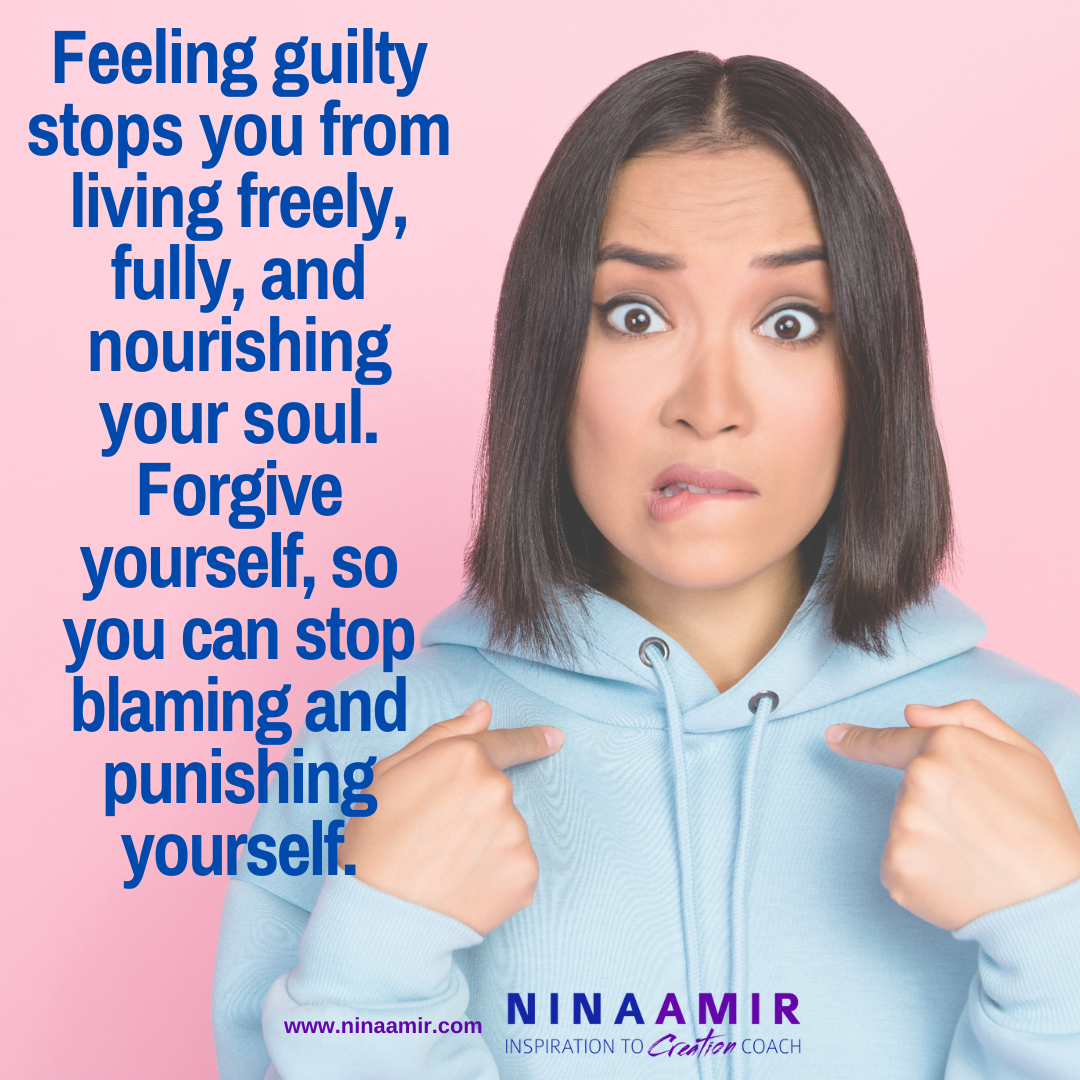It’s common to feel guilty—even when you’ve done nothing wrong. You might even blame yourself before anyone else points the finger at you and says, “It’s your fault.” But guilt and blame are low vibrations that make it difficult to create what you desire or live fully and freely.
In fact, guilt and blame weigh you down. Felt often enough, these emotions can create illness, cause you to hold back or hide, and make it difficult to manifest your desires. And they make it hard to feed your soul.
And no one likes feeling at fault, blamed, or guilty—especially if you believe you haven’t done anything wrong. Even if you are at fault, it’s challenging to deal with such emotions.
Childhood Guilt Becomes Adult Guilt
Yesterday, I had a session with my coach, and we explored how I felt guilty or blamed as a child. I quickly recalled the times I was blamed for eating all the Oreo cookies (when I hadn’t), for spilling my milk at the dinner table (by accident), and for taking my sister’s Barbie doll (on purpose). I also remembered spilling iodine on my mother’s light-blue bathroom rug and telling her in a letter that it was my fault.
As an adult, I recall feeling enormously guilty about how I handled raising my two stepchildren. My husband rarely blamed me for anything related to his kids. Still, I felt guilty all the same—so much so that I considered myself unworthy of his love. My self-blame and guilt created a rift between us that lasted many years.
I also remember a recent incident when someone told me I had done something wrong but wouldn’t tell me what. I apologized several times for something I didn’t even know I had done and, therefore, had done it unintentionally. And I felt guilty and blamed.
Surprisingly, the incidents from my youth stuck with me and caused a habitual reaction. If something goes wrong, subconsciously, I feel at fault and expect to be blamed. For instance, if my husband is angry, I assume it’s because of something I did. Usually, it has nothing to do with me, though.
I can tell you, that’s a lousy way to live. It’s like being in a perpetual state of fear that you will or have done something wrong and will be blamed. It’s a sense of guilt with or without a jury declaring you so. There is no presumed innocence—at least not from your internal judge and jury.
The Health Impact of Feeling Guilty
As long as you feel guilty, you function in a state of hyper-vigilance, always looking for the next reason someone has to point their finger at you. You look critically at your thoughts, actions, and words, and interpret other people’s words and actions to mean they are doing the same—looking for a reason to blame you.
The state of feeling guilty has an impact on your mental and physical health as well. For example, excessive, irrational guilt is linked to mental illnesses, such as anxiety, depression, dysphoria (feelings of constant dissatisfaction), and obsessive–compulsive disorder (OCD). Plus, studies show that people with higher guilt feelings—but not shame—were more likely to suffer from chronic diseases like arthritis, back pain, cardiovascular disease, asthma, and cancer.
If you care about your health, this data should be enough to convince you that it’s time to stop feeling guilty.
Let Yourself Off the Hook
If you feel guilty, at fault, or blamed, let yourself off the hook first! Realize that you are a pure soul.
Jewish liturgy has a lovely phrase: Elohai neshama shenatata bi t’horah hi. Translated from the Hebrew, this means: My God, the soul You have given me is pure. I used to love chanting this line. And I suggest you use it as an affirmation.
After all, that’s what you are—a pure soul in a physical body. Might you occasionally do, say, or think something “impure” or that hurts someone or something? Yes, of course. You are human. But that does not make you inherently bad or evil. Remember this, and you will begin to know you have no cause to feel guilty all the time.
Continually feeling guilty is the same as telling yourself there is a reason to blame yourself. It’s like believing something inherently bad or wrong about your actions, thoughts, and words—about the essence of who you are. As a result of such thoughts, you feel as if you are wrong or bad. That’s not a good way to live, is it?
You also cannot live a life that feeds your soul when you feel guilty or blame yourself. Your pure soul needs nourishment, not punishment. It needs to be appreciated and acknowledged, not condemned or hidden.
When You are at Fault
Before I discuss ways to stop feeling guilty, let me offer a caveat. If you know you have done something “wrong,” fess up! Apologize. Make amends. Then go on your way—let it go. And commit to not doing the same thing again.
If the other person doesn’t accept your apology, that’s on them, not you. Stop feeling guilty! You did all you could. Even if they can’t forgive you, forgive yourself.
And forgiving yourself is a huge step toward reducing your guilty feelings. Forgive yourself for everything you’ve blamed yourself for in the past. And if others still blame you, ask for forgiveness. If they can’t offer that, again…forgive yourself.
Forgive Yourself for the Past
I’ve used a variety of methods to help me release guilt. Energy healing, hypnosis, therapy, and visualization have all proved helpful.
Ultimately, I chose to reinterpret my past, which allowed me to see and interpret my present in a new light.
Self-blame and the resulting guilty feelings stem from your inner self-judgments based on past failings. If I consider the person who recently ghosted me because of something I supposedly did or said, my mind searches for past times when a friend misinterpreted my words and felt the need to part ways. In other words, I call on the past to inform the present, yet, the past likely has nothing to do with current events.
Your memories of the past are based on interpretations, your stories about what happened. And they are almost always incorrect. Yet, you continue to judge yourself based on those interpretations.
Thus, to move out of guilt, let the past go. Let those stories go, or choose to reinterpret those stories in a new light. This is the most effective way to stop feeling guilty.
For instance, let’s say your jealous boyfriend in high school claimed you cheated on him. Now you consider yourself untrustworthy or a cheater if you even think another person is attractive. Yet, you’ve never cheated on an intimate partner. You have allowed that one incident to cloud how you see yourself.
Your new interpretations and lessened guilt result in fewer reasons to blame yourself. And as you forgive yourself, you become less likely to blame others.
When I say to myself, “Whatever is wrong or going on has nothing to do with me,” I free myself of guilt. I stop blaming myself for things that likely have nothing to do with me.
Reclaim Your Energy
You reclaim your energy and power when you let go of guilt and blame. All the time spent blaming yourself or others and feeling guilty or judgmental causes an energetic drain on your system. Forgiveness allows you to reclaim and use that energy in more positive ways.
Also, consider that guilt and blame require punishment. If you point the finger at yourself, you will tend to find ways to punish yourself. Maybe, as I did, you withhold love from your partner and punish yourself by not allowing yourself to receive love.
With less guilt and blame, you reduce the need to punish yourself, which gives you more energy…more creative energy. Plus, you vibrate at a higher frequency, which provides you with a greater ability to create what you desire.
Stand in Your Power
Plus, forgiveness allows you to stand in your power. As long as you believe you are at fault for something, you give your power to external sources. After all, if no one knew what you had done or claimed it was your fault, you likely wouldn’t feel guilty. You’d feel innocent.
Only your expectation of external judgments and criticism—and the resulting punishment—cause you to blame yourself.
For instance, I felt guilty as long as I continued to wrack my brain to discover what the friend who ghosted me thought I had done wrong. I critically viewed every Facebook message or post that included her, every text message I’d written, and more. When I stopped seeing myself, my words, and my actions through her eyes, I could stop blaming myself for something I didn’t even know I’d done. I forgave myself. At that moment, I took back my power and raised my energetic frequency and level.
You Know if You’re Guilty
Most of your sense of right or wrong has been programmed by the society in which you live. Ultimately, however, you know if you are at fault. Your soul knows.
When your values and beliefs about right or wrong are your own—not something dictated by others—you can determine if you have a reason to feel guilty. If not, you will also be able to stop blaming and punishing yourself.
So put your thoughts, words, and behavior through your personal trial. Be your own judge and jury. And, more likely than not, you will arrive at an “innocent” verdict. That’s when you can finally release yourself from the jail cell into which you locked yourself and allow yourself to live freely and fully.
Do you often feel guilty or blame yourself? Tell me in a comment below. And please share this post with a friend or on social media.
If you want to take back your energy, stand in your power, and live a life that feeds your soul, let’s chat. Get on my calendar here. Or join the Inspired Creator Community for group transformational coaching every month.
 It’s time to transform, is it not? Join the Inspired Creator Community. You probably already realize that you need to change from the inside out. That’s how you become a person who does the things that allow you to create your desires. As a member, you get access to intuitive transformational coaching, world-class personal growth coaching, and strategies for living a life that feeds your soul. And you will discover that you are a powerful creator able to create what you want (not what you don’t want). Join now!
It’s time to transform, is it not? Join the Inspired Creator Community. You probably already realize that you need to change from the inside out. That’s how you become a person who does the things that allow you to create your desires. As a member, you get access to intuitive transformational coaching, world-class personal growth coaching, and strategies for living a life that feeds your soul. And you will discover that you are a powerful creator able to create what you want (not what you don’t want). Join now!Photo courtesy of: deagreez



